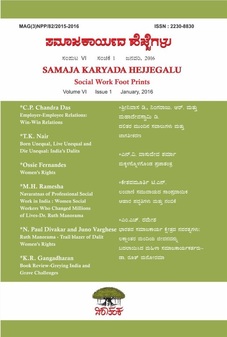|
Samajakaryada Hejjegalu (Social Work Foot Prints) has completed five years. During the past five years, we are gratified with the growth of the social work journal along with our popular website www.socialworkfootprints.org and the Niruta Publications under the auspices of which many social work books have been published. The present issue of SWFP has five articles in English. The article “Employer-Employee Relations: Win-Win Relations” is indeed an essay on the reminiscences of C.P. Chandra Das, who was a role model to industrial relations managers in industries in Tamilnadu during his service spanning more than a half century. The article focuses on the positive elements required to ensure long-lasting peace in industries. The article discusses some successful collective bargaining agreements at Coimbatore and at Chennai along with the turbulent period in Ashok Leyland when a militant leader assumed the Presidentship of the trade union. T.K.Nair’s article “Born Unequal, Live Unequal and Die Unequal : India’s Dalits” portrays the dismal situation of the Dalits and the atrocities perpetrated on them even after death. He succinctly describes the birth-based caste system. He analyses the POA Act and its poor implementation. The article concludes with the final words of Dr.B.R.Ambedkar. “Women’s Rights” by the late Ossie Fernandes, one of the tallest human rights defenders during his life time, elaborates the meaning and scope of human rights as the collective rights of peoples and communities. The article explains the different perspectives and approaches of human rights. The article critically analyses the power of impunity. Special attention is also given in the article to the concerns of women with disabilities, women victims of evictions, and women belonging to minorities and fishing communities. Ruth Manorama is the Navaratna of Professional Social Work in this issue. Recipient of the Right Livelihood Award, known as the Alternative Nobel Prize, Ruth Manorama has spent about four decades in liberating Dalit women in India. Paul Namala Divakar and Juno Varghese critically look at the contribution of Ruth Manorama in their article “Ruth Manorama-Trail Blazer of Dalit Women’s Rights”. They also examine the ‘pro’s and ‘con’s in internationalising the local issues of Dalit women. K.R.Gangadharan, Past President of the International Federation on Ageing, reviews the book “Older People in Rural Tamilnadu” by T.K.Nair, which has been published by Niruta Publications. He commends the book for its significance in the important findings as well as for the research methodology. The Kannada section of the journal has three articles besides the translation of the profile of Ruth Manorama, a famous Kannadiga (though not by birth) woman social activist. D.Srinivas, R.Ningaraju and D.Mahadevaswamy, in their article on Dalits and Globalisation, explain the conditions of the Dalits, the most indigenous section of Indian society, and examine the impact of globalisation on the lives of the Dalits. The authors make a strong case of Buddhism and Ambedkar’s messages. Inclusive Democracy and Children by N.V.Vasudev Sharma, underscores the importance of children’s participation in Indian democracy. The article explains the special Grama Sabha of Children’s Rights started by the Child Trusts Act. Traditional Food Practices and Beliefs among Lambani Community by T.N. Keshavamurthy is an article that analyses the relationships between food habits and cultural beliefs among Lambani tribes based on an empirical investigation in three districts in Karnataka. M.H. Ramesha |
Categories
All
Social Work Learning Academy50,000 HR PROFESSIONALS ARE CONNECTED THROUGH OUR NIRATHANKA HR GROUPS.
YOU CAN ALSO JOIN AND PARTICIPATE IN OUR GROUP DISCUSSIONS. MHR LEARNING ACADEMYGet it on Google Play store
|
SITE MAP
SiteTRAININGJOB |
HR SERVICESOTHER SERVICESnIRATHANKA CITIZENS CONNECT |
NIRATHANKAPOSHOUR OTHER WEBSITESSubscribe |
MHR LEARNING ACADEMY
50,000 HR AND SOCIAL WORK PROFESSIONALS ARE CONNECTED THROUGH OUR NIRATHANKA HR GROUPS.
YOU CAN ALSO JOIN AND PARTICIPATE IN OUR GROUP DISCUSSIONS.
YOU CAN ALSO JOIN AND PARTICIPATE IN OUR GROUP DISCUSSIONS.
|
|







 RSS Feed
RSS Feed





